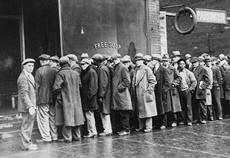Jobless economic recovery to hit young the hardest: ILO
21 Jan 2014
Young people may be the worst hit and the world could face years of jobless economic recovery, the International Labour Organisation (ILO) has warned.
 As the World Economic Forum opens in the Swiss city of Davos tomorrow to focus on growing inequality, the ILO has pointed out the "potentially dangerous gap between profits and people".
As the World Economic Forum opens in the Swiss city of Davos tomorrow to focus on growing inequality, the ILO has pointed out the "potentially dangerous gap between profits and people".
According to the UN agency's projections, millions more people would join the ranks of the unemployed as companies choose to increase payouts to shareholders rather than invest their profits on the workers.
According to the ILO's Global Employment Trends, world unemployment would rise to 6.1 per cent this year from 6 per cent in 2013 and would remain well above its pre-crisis rate of 5.5 per cent for several years.
It estimates the youth unemployment rate at 13.11 per cent, more than double that for the whole workforce and almost three times the adult rate of 4.6 per cent – a record for the ratio of youth to adult unemployment
Guy Ryder, the ILO's director-general also highlighted rising inequality as wages failed to pick up with intensification of long-term unemployment problems and progress cutting working poverty.
He added, corporate profits were up and global equity markets were looking forward to another year of plenty, while at the same time unemployment and household incomes stood still.
Ryder warned that the economic and social consequences of inequality, would see a worsening of labour market problems this year.
According to the ILO, 5 million more people became unemployed last year, taking the global total to 202 million.
That figure is expected to rise to 215 million jobseekers by 2018 as employment growth, at 40 million net new jobs a year, failed to keep pace with the 42.6 million people expected to enter the labour market every year.
Young people would continue to be particularly affected by what the ILO described as a "weak and uneven recovery".
Meanwhile, the proportion of young people in the category 'not in employment, education or training' (NEETs) continued to increase, with some of the worst rates in those countries hit by the eurozone crisis. In Spain and Ireland more than one in five young people were NEETs.
The ILO projects that 200 million new jobs would be created by 2018, but those jobs would not be enough to keep pace with growing numbers in the labour market unemployment would therefore exceed 215 million.



















